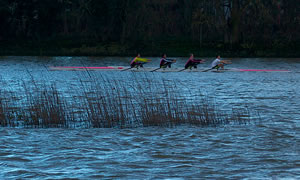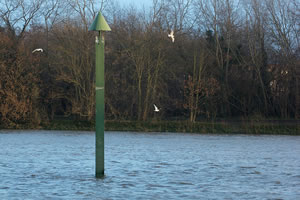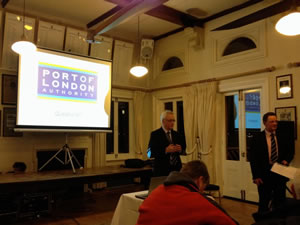PLA Chief Executive Warns Of ‘Unprecedented' River Conditions
Sharp increase in RNLI rescues of rowers raises concern over possibility of fatalities
|
Port of London Authority chief executive Richard Everitt has given a stark warning about safety on the Thames saying, “We are in unprecedented times.”
He made the comments during a public meeting at London Rowing Club in Putney last Tuesday (11th February).
He also spoke about the large number of recent incidents involving rescues by Chiswick RNLI of capsized rowing boats / crews:
“There’s been too many accidents. Too many incidents. If we’re not careful we’re going to have some fatalities on our hands. People need to take responsibility.”
With over four times more water than usual currently reported to be flowing down from Teddington to us in the ebb tide (500 cubic metres a second), the main focus of discussion and some fairly heated debate last night was the Port of London Authority’s new “Ebb tide flag warning system” - an advisory notice “due to the continuing number of serious incidents occurring during the current high fluvial flows”.
It includes a red flag warning which states: “Extreme caution - Ebb Tide Very Strong Fluvial Flows. The Port of London Authority advise all river users that the fluvial flows are very strong and conditions are difficult and dangerous. All man-powered vessels are advised not to go afloat on the Ebb Tide.”
Richard spoke about the “most severe conditions” anyone could remember. “The flowdown from the west is unprecedented.” With particular concern about the speed of the flow and the information relayed to rowers. “The dangers out there at the moment are heightened by any standards and more tricky than any in living memory.”
PLA chief harbour master David Phillips said 16 people had been taken out of the water so far this year - 15 having been rowers rescued by Chiswick RNLI which, as we know, is already one of the busiest lifeboat stations in the country.

Chiswick Eyot Fringe (Pic: Ian Wylie)
The red flag (placed on Richmond Lock, on PLA patrol boats and communicated via the web etc) was particularly aimed at schoolchildren and novices out on the river in extreme conditions. “I’ve seen boats broken up on piers with children in them,” added David.
A member of the packed audience also reported that a “senior quad” had been “wrapped around Kew Pier at 11am on Sunday” and were rescued by the RNLI.
Another stated that the RNLI has had to rescue a crew “every weekend since Christmas”.
But several rowing club representatives / coaches etc expressed concern about the new red flag system. While fully understanding the reasons behind it, a red flag might stop experienced crews, including international rowers, from being able to go out on the river. While a red flag was “advisory” and for clubs etc to make their own decisions, it would have both potential insurance and legal implications should crews go out and an accident occur - bearing in mind accidents can happen on the river in all conditions. Coaches also had to answer to employers, sponsors etc.

Chiswick Eyot Marker (Pic: Ian Wylie)
David Phillips again stressed the “advisory” nature of the red flag, saying: “Our biggest worry is novices and schools.” He said it was up to clubs etc to make a decision themselves about experienced crews but they should “look very seriously at this” and make a detailed risk assessment of their own abilities and capabilities in the conditions.
A number of people asked that the wording of the current notice / warning be amended to reflect what the PLA had said at the meeting and also requested more flexibility.
One lady said she had used the river for 60 years and described the current state of the river in our area as: “The worst conditions I have ever come across.” It was also pointed out that the red flag system may only be needed for a number of weeks before conditions ease and then, perhaps, might have to return at Christmas.
Chiswick RNLI station manager Wayne Bellamy then added his voice to the meeting. He said his crews had attended 13 incidents in the last 7 weeks. 4 in December, 7 in January and 2 so far in February - all involving capsized boats. Already more incidents than in the whole of 2012. Stressing: “And that has happened in 7 weeks.” Half of those 13 incidents were in the stretch of river between Hammersmith and Chiswick.
He added: “Over half of those jobs have been rowers not allowing enough time on turns and being swept broadside.”
The PLA said the red flag system was “very new” and they were anxious to work with all involved to make it better. The wording would be looked at but there were doubts from some in the audience as to whether the relevant rowing body working with the PLA would take any notice of their views.
Ian Wylie
February 12, 2014
